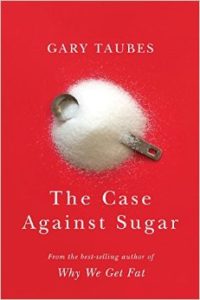Source http://www.foodpolitics.com/2016/12/reading-for-the-new-year-gary-taubes-case-against-sugar/
Gary Taubes: The Case Against Sugar. Knopf, 2016.

The title of this book says just what it is: a legal brief arguing that sugar is the cause of just about everything that ails us: obesity, type 2 diabetes, and heart disease, of course, but also cancer, high blood pressure and, therefore, stroke, as well as gout and Alzheimer’s disease.
This book makes a different argument: that sugars like sucrose and high-fructose corn syrup are fundamental causes of diabetes and obesity, using the same simple concept of causality that we employ when we say smoking cigarettes causes lung cancer. It’s not because we eat too much of these sugars…but because they have unique physiological, metabolic, and endocrinological (i.e. hormonal) effects in the human body that directly trigger these disorders.
Sugar, Taubes says, is the basis of a simple unifying hypothesis—insulin resistance—to explain all of these conditions. To make this case, he provides vast amounts of evidence: historical, observational, and interventional.
Is he right? Many of his hypotheses are testable and it is greatly to his credit that he has organized the Nutrition Science Initiative (NuSi) to do …
Source http://www.foodpolitics.com/2016/12/reading-for-the-new-year-gary-taubes-case-against-sugar/
Gary Taubes: The Case Against Sugar. Knopf, 2016.

The title of this book says just what it is: a legal brief arguing that sugar is the cause of just about everything that ails us: obesity, type 2 diabetes, and heart disease, of course, but also cancer, high blood pressure and, therefore, stroke, as well as gout and Alzheimer’s disease.
This book makes a different argument: that sugars like sucrose and high-fructose corn syrup are fundamental causes of diabetes and obesity, using the same simple concept of causality that we employ when we say smoking cigarettes causes lung cancer. It’s not because we eat too much of these sugars…but because they have unique physiological, metabolic, and endocrinological (i.e. hormonal) effects in the human body that directly trigger these disorders.
Sugar, Taubes says, is the basis of a simple unifying hypothesis—insulin resistance—to explain all of these conditions. To make this case, he provides vast amounts of evidence: historical, observational, and interventional.
Is he right? Many of his hypotheses are testable and it is greatly to his credit that he has organized the Nutrition Science Initiative (NuSi) to do …
What Do You Think?
comments
